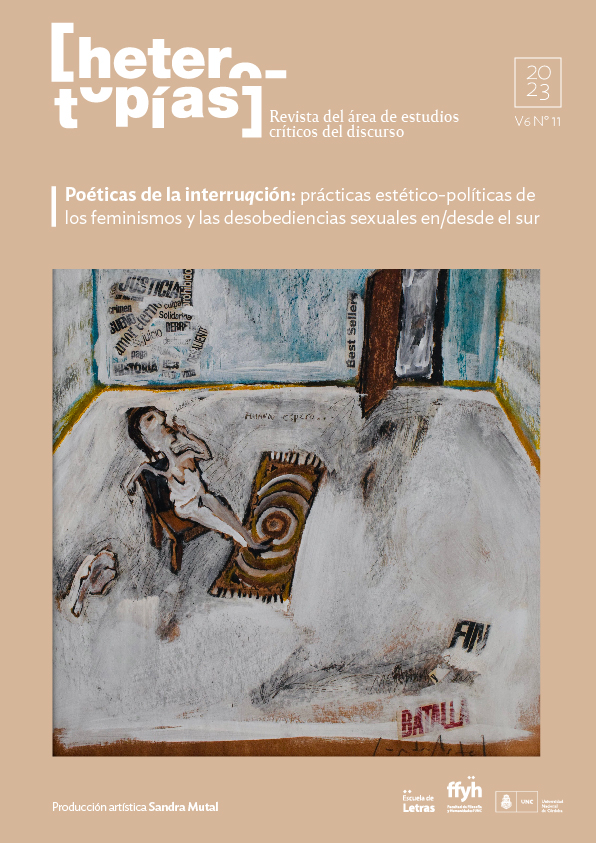Words of memory: Leopoldo Brizuela as coordinator and archivist of the Mothers of Plaza de Mayo Writing Workshop (1990-1998)
Main Article Content
Abstract
The Leopoldo Brizuela Documentary Fund belongs to the Department of Archives of the National Library of the Argentine Republic "Mariano Moreno" takes care of a series of documents that were produced within the framework of the Writing Workshop of the Association of Mothers of Plaza de Mayo during the period 1990-1999. Brizuela, in his role as coordinator of the workshop and producer of the archive, and the Mothers of the Plaza de Mayo, authors of the literary stories gathered there, combined his efforts to imagine new possibilities to approach history and individual and collective memory. This work investigates the links between archival and writing practice considered as two aesthetic-political modes that, during the first decade of post-dictatorship, launched narrative forms against the grain of the hegemonic historiographical accounts. The figure of the archivist as translator, in the case of Brizuela; the problem of secrecy, loss and spectrality, around the archive and the concern of the Mothers of Plaza de Mayo to build through the word an image and a history of themselves, as women and activists, constitute the main three nuclei of attention of this writing.
Downloads
Article Details
Section

This work is licensed under a Creative Commons Attribution-NonCommercial-ShareAlike 4.0 International License.
Those authors who have publications with this journal, accept the following terms: Those authors who have publications with this journal, accept the following terms:
a. The authors will keep their copyright and guarantee to the journal the right of first publication of their work, which will be simultaneously subject to the Creative Commons Attribution - Non-Commercial - Share Alike (by-nc-sa) Attribution License; no commercial use of the original work or any derivative works is allowed, the distribution of which must be done with a license equal to the one that regulates the original work.
b. Authors may adopt other non-exclusive license agreements for the distribution of the published version of the work (e.g., deposit it in an institutional telematic archive or publish it in a monographic volume) provided that the initial publication in this journal is indicated.
c. Authors are allowed and recommended to disseminate their work through the Internet (e.g. in institutional telematic archives or on their website) before and during the submission process, which may lead to interesting exchanges and increase the number of citations of the published work. (See The effect of open access).
How to Cite
References
Brizuela, L. (2014). “El derecho de leer a las mujeres”. Eterna Cadencia Blog, [en línea]. Consultado el 15 de septiembre de 2022. http://bit.ly/3TOwBHT.
Cruz Mundet, J. (2014). “Principios, términos y conceptos fundamentales”. Administración de documentos y archivos. Universidad Carlos III de Madrid: CAA.
Damiano, I. (2014). “Nada genera más narración que los detalles”. Eterna Cadencia Blog, [en línea]. Consultado el 19 de septiembre de 2022. https://bit.ly/3fSdMFK.
De Meglio, E. (2020). “La escritura de la memoria como acto de traducción. La traducción como trabajo de memoria”. Trans, 24, 229-244.
Kartun, M. (2015). Escritos (1975-2015). Buenos Aires: Colihue.
Laudano, C. (1998). Las mujeres en los discursos militares (1976-1983). Buenos Aires: La página.
Matute, A. (2005). “La historia como ideología”. Configuraciones, 17, 5-15.
Mbembe, A. (2020). “El poder del archivo y sus límites”. Orbis Tertius, 25 (31), 01-07.
Monti, R. (1979). “Las imágenes en la creación literaria”. En Memoración de Sigmund Freud. (pp. 43-47). Buenos Aires: Trieb.
Pfeifer, G. (2019). “Las formas del don”. Cuadernos de la BN., 4 (18), 24-25.
Proaño Gómez, L. (2018). “Desenmascaramiento de la ideología del discurso dictatorial: la maternidad y la familia como instituciones fundamentales de la nación”. telondefondo. Revista de teoría y crítica teatral (28), 53-68[en línea]. Consultado el 20 de octubre de 2022. http://bit.ly/3OpzayZ.
Rufer, M. (2010). La nación en escenas. Memoria pública y usos del pasado en contextos poscoloniales. México: El Colegio de México.
(2020a). “Presentación: Prácticas de archivo, teorías, materialidades, sensibilidades”. Corpus. Archivos virtuales de la alteridad americana [en línea], 10 (2), 1-4.
(2020b). ”Lenguajes del archivo: extracción, silencio, secrecía”. Heterotopías, 3 (6), 1–20. https://bit.ly/3e6We8l.
Saba, M. (2020). “Postdictadura y dramaturgia: paradigmas antagónicos de su enseñanza y aprendizaje durante los 90 en Argentina”. En Cancellier,A. y Barchiesi, M. (eds.), Teatro, prácticas y artes performativas des testimonio y la memoria. (81-98). Padova: Cooperativa Livraria Editricie Universita di Padova.
Steiner, G. (1980). Después de Babel. Aspectos del lenguaje y la traducción. México: FCE.
Verzero, L. (2010). “La escena como reparación del daño”. Boca de sapo. Revista de arte, literatura y pensamiento, XI (5), 34-40.
(2020a). “La construcción social de la figura del perpetrador: procesos sociales, luchas políticas, producciones culturales”. Kamchatka. Revista de análisis cultural, 15, 217-241.
(2020b). “Cuerpos subvertidos. Artes escénicas y memoria en el siglo XXI. El caso argentino”. Historia y memoria, 21, 137-172
Villanueva, L. (2018). Maestros de la escritura. Buenos Aires: Ed. Godot.
Textos fuente consultados
Benites Dumont, A. (1993). “Taller de escritura de las Madres de Plaza de Mayo. Entrevista a Leopoldo Brizuela”. SAL. Revista del Movimiento para la liberación e igualdad de la mujer, 15, 24-26.
Brizuela, L. (1993). “La parole comme manifestation de la vie. Les ateliers d´écriture des Mères de la Place de Mai ». Le Monde Alphabétique, 06, 53-53
(1994). “Madres de Plaza de Mayo. Taller de escritura: la escritura como aparición con vida” Proyecto del Taller.
(1990-1997). “Memorias de clases”.
Gambaro, G. (1993-1997). Correspondencias.
